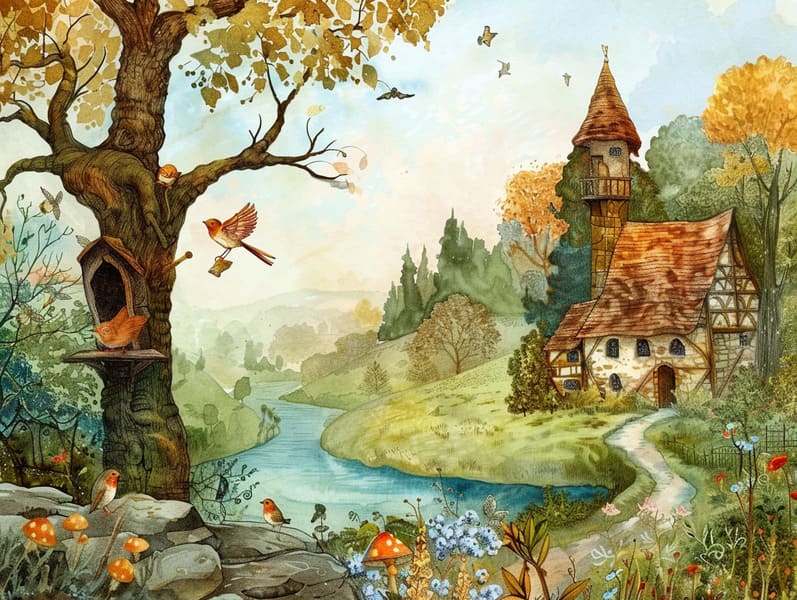Embracing the Charm of Evening Tales: Establishing Cherished Times with Kids
Embracing the Charm of Evening Tales: Establishing Cherished Times with Kids
Blog Article

Nighttime is a important time for parents and children. It’s a time to relax, get cozy, and partake in the wonder of nightly stories.
For generations, children's bedtime stories have been a treasured tradition, offering more than just a way to go to sleep. They provide an opportunity for connection, growth, and encouraging dreams.
Significance of Bedtime Stories
Children's bedtime stories do more than a way to wrap up the day. They play a key role in a child’s development and in enhancing the caregiver-child connection. Here’s why they are valuable:
1. Connection Time: Telling bedtime tales encourages a special moment of connection between families. It’s a moment of affection that helps children feel appreciated and comforted.
2. Vocabulary Building: Absorbing tales helps children develop their speech skills. They acquire new vocabulary, understand form, and refine their attention and interpretative skills abilities.
3. Inventiveness: Nightly stories transport them to wondrous worlds, encouraging fantasy. They visualize characters, settings, and adventures, which fuels their inventiveness.
4. Emotional Growth: Kids' tales often feature characters facing difficulties and feelings. These narratives help kids understand and address their own moods, building emotional growth.
5. Cognitive Development: Listening to a tale helps children develop awareness, memory, and reasoning skills. They enhance to follow scripts, remember pieces, and deduce results.
Integrating Bedtime Stories into Your Night
Creating a bedtime routine that features storytelling is manageable and rewarding. Here’s how to turn it into a valued part of your sleep-time practice:
1. Pick a Snuggly Spot: Choose a comfortable place where you and your child can huddle together without interruptions. A relaxing bed or a peaceful reading nook works perfectly.
2. Choose a Set Time: Set a consistent time each night for reading. Uniformity helps children be ready and makes the practice easier to maintain.
3. Pick Age-Suitable Stories: Opt for tales that are appropriate for your child’s developmental stage. Toddlers might be engaged by visual books with uncomplicated narratives, while grown children may enjoy novels with more engaging plots.
4. Animate the Tale: Make the tale feel vivid by trying different voices for characters, adding special sounds, and getting your child to take part. Ask queries about the story to involve them.
5. Make a Peaceful Setting: Dim the lights, use soft voices, and create a tranquil environment to help your child relax.
Locating the Best Bedtime Stories
There are endless places to look where you can find amazing bedtime stories for children. Here are some choices to explore:
1. Kids’ Books: Visit your local library or bookstore get more info to find a varied selection of bedtime stories for kids. Perusing the options together can be a fun activity that also gives children to select stories that appeal to them.
2. Internet Resources: There are many internet sites that offer free bedtime stories. Sites like children's story websites provide a variety of short stories for kids that you can print out. These websites are great for finding new and unique stories without charges.
3. Apps and Audiobooks: For nights when you’re too fatigued to read, use audiobooks or storytelling apps. These can provide a calm narration to read your child a story, ensuring they still get their bedtime story fix. Apps often offer interactive aspects that can engage children further.
4. Tailored Stories: Create your own stories tailored to your child’s preferences. Personalized stories can be very engaging and meaningful. You can involve your child in the crafting process, making them a part of the adventure.
Benefits of Shorter Stories
Brief stories for children are very beneficial for bedtime. They provide all the plusses of longer stories but are more succinct, making them perfect for settling down before sleep. Here’s why short stories are a great choice:
1. Straightforward: Compact stories are uncomplicated and understandable for kids, even after a long day. They can readily grasp the theme and enjoy the story without becoming uninterested.
2. Immediate Interest: These stories readily engage children, keeping their concentration and interest. This makes them perfect for keeping bedtime rituals manageable yet enjoyable.
3. Various Options: Short stories allow for variety in your bedtime stories. You can choose a different story each night, keeping the routine fresh and exciting for your child.
4. Time Efficiency: For busy parents, compact stories are a easy way to confirm children still get their nightly dose of storytelling. They fit well into a tight schedule while still offering the full benefits of a bedtime story.
Why "Read Me a Story" is Magic
The simple phrase, “Read me something,” can bring a world of magic for children. Responding to this request not only meets a child’s desire for attention and engagement but also forms lasting moments. Here’s why it’s wonderful:
1. Link: Storytelling to your child fosters a deep emotional attachment. It’s a time for togetherness, sharing, and bonding.
2. Legacy: Developing a bedtime story habit creates a important tradition that children wait for every night. It’s a tradition that can be given through generations.
3. Learning and Growing Together: As you tell tales, you’ll witness your child’s maturation and development. Their responses, reactions, and understanding of the stories advance, offering insights into their developing minds.
4. Comfort Zone: Bedtime stories provide a safe space for children to navigate emotions, face fears, and find comfort in the reliable presence of a parent.
To Conclude
Kids’ bedtime stories are a important tool for fostering a child’s maturation and establishing unforgettable memories of closeness.